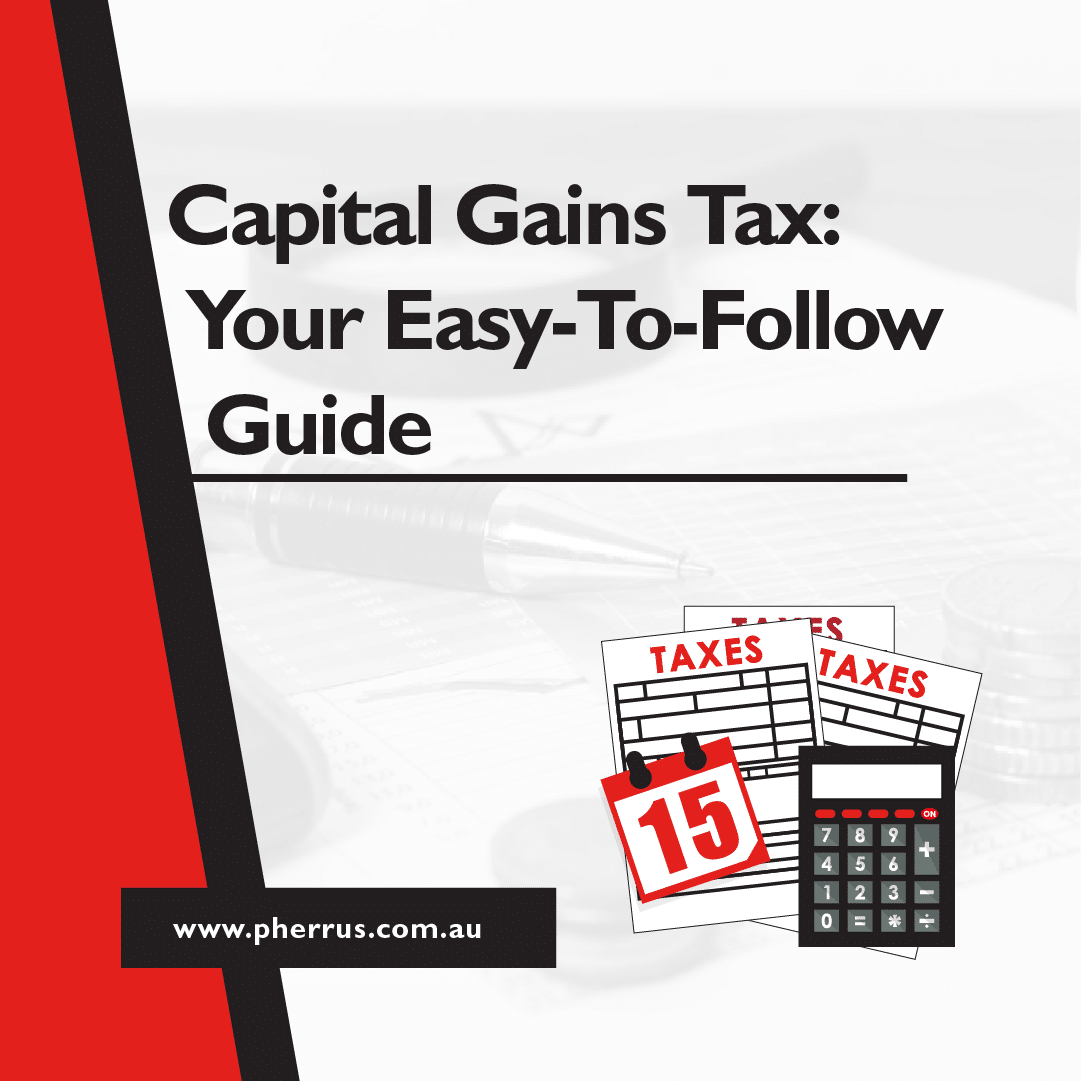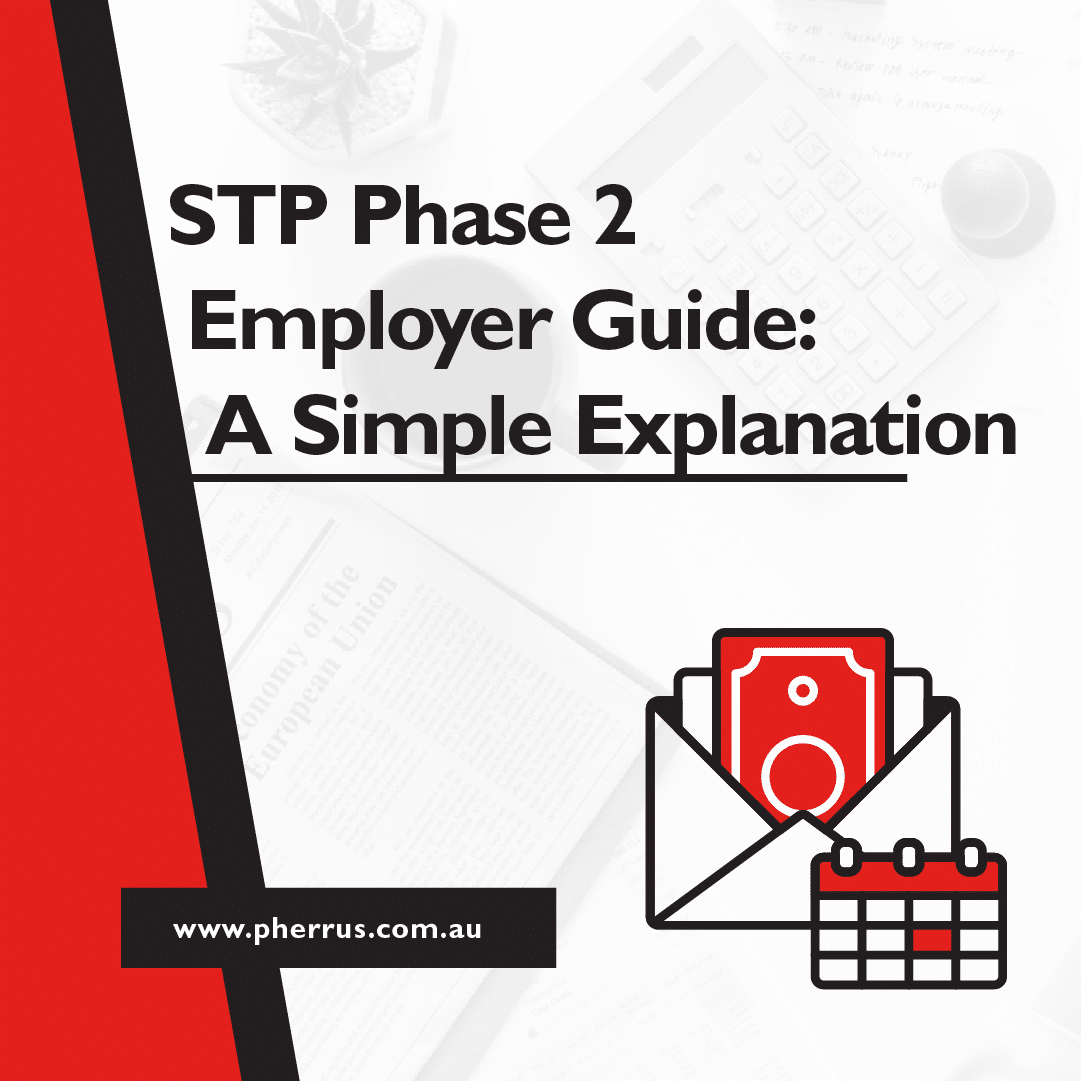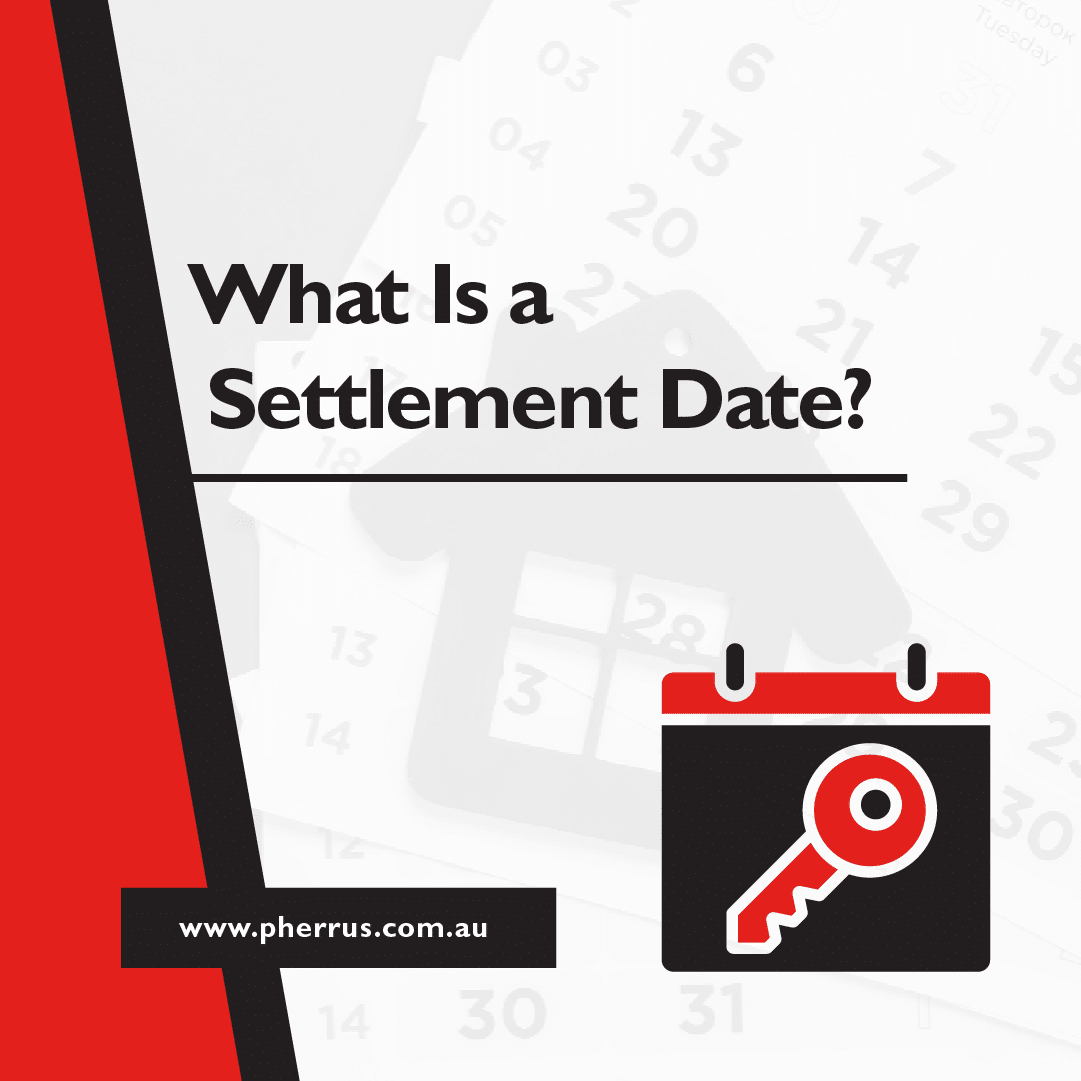You’ve just sold your rental property, which you’ve carefully maintained and maybe even renovated over the years.
The sale price is excitingly high, and you can almost taste the freedom and possibilities this windfall brings.
But then, a question looms- how much of this sale price is actually yours to keep? Enter capital gains tax (CGT).
You need to know, “How much capital gains tax on property will I pay?”
This guide will walk you through the essentials of Australian capital gains tax so you can confidently handle your property sale and understand how much CGT you’ll have to pay.
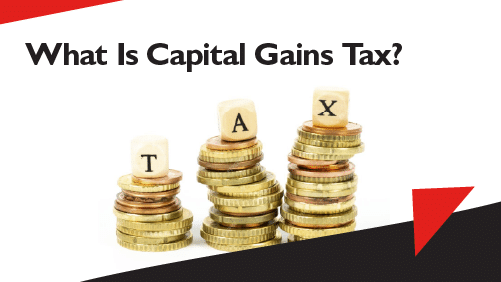
What Is Capital Gains Tax?
First things first: what is a capital gain?
A capital gain is the profit you make from selling an investment asset, such as property.
It’s the difference between the price you originally paid for the asset (plus any costs related to buying, selling, and improving it) and the price you sell it for.
Capital gains tax in Australia is a tax you pay on this capital gain as part of your income tax.
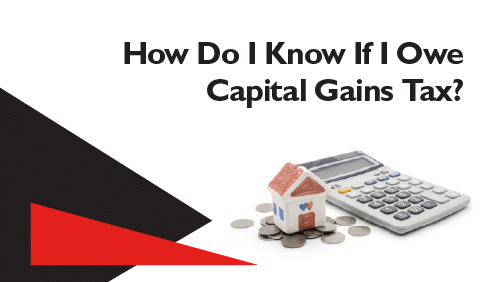
How Do I Know If I Owe Capital Gains Tax?
Assets subject to CGT include
-
- Real estate: Rental properties, vacant land, holiday houses, hobby farms, and business premises
- Your home IF: You use it for business, you rent out part of it, it’s on more than 2 hectares of land, you’re a foreign resident and do not qualify for the main residence exemption
- Personal use assets over $10,000: Furniture, electrical goods, and boats
- Foreign currency from overseas rental property
- Shares
- Cryptocurrency
Assets exempt from CGT include
-
- Your home if it’s only lived in by you and your family
- Assets acquired before September 20, 1985
- Cars and motorcycles
- Eligible granny flat arrangements
- Depreciating assets used solely for taxable purposes: Items in a rental property and business equipment
To answer the question: “How much capital gains tax on property will I pay?”, remember that you only pay capital gains tax on investment property, not your home property.
So, if you’re an Australian resident and your home has been the primary dwelling for you, your partner, and other dependents the entire time you’ve owned it, it’s exempt from CGT.
Calculating Capital Gains Tax: An Example
Step 1: Calculate the Property’s Cost Base
Your investment property’s cost base is how much you spend to acquire, hold, and sell the property.
Let’s say you bought an investment property for $700,000 and paid $27,000 in stamp duty and $4,000 in legal fees.
Your total cost base would be $700,000 + $27,000 + $4,000 = $731,000.
Over the years, you also spent $30,000 on renovations and repairs, which is added to your cost base, bringing it to $761,000.
Step 2: Calculate the Property’s Sale Price
You sell the property four years later for $850,000.
Step 3: Calculate the Capital Gain or Capital Loss
Subtract the property’s cost base from its sale price to determine your capital gain or loss.
$850,000 (sale price) – $761,000 (cost base) = $89,000 capital gain.
Step 4: Apply CGT 50% Discount if Applicable – (the CGT will be halved)
A 50% discount is applied (if held for more than 12 months) = $44,500.
This means the Net Capital Gain after discount = $44,500.
Step 5: Calculating Capital Gains Tax
Capital gains are added to your income and taxed at your marginal tax rate.
So, if your annual taxable income is $70,000 and your capital gain is $44,500 add the two figures together, and you’ll pay income tax on that amount: $114,500.
Based on the 2023-2024 tax brackets, this taxable income total would place you in the 32.5% tax bracket.
The ATO’s website has a tax calculator that determines how much you’ll pay on your taxable income, considering the basic tax scales, low-income tax offset (if applicable), and 2% Medicare levy.
Using this calculator, your estimated annual tax liability (including CGT) on $114,500 would be $27,679.50.
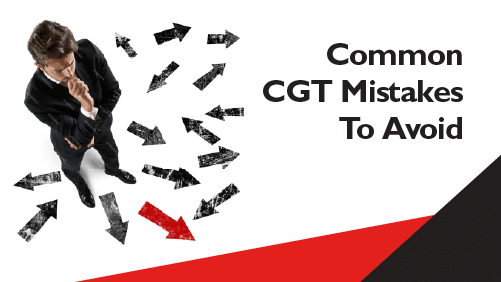
Common CGT Mistakes To Avoid
-
- Failing to keep accurate records of your property transactions and related expenses. This can prevent you from substantiating your cost base, potentially leading to a higher taxable capital gain.
- Not claiming all allowable deductions. You can deduct certain expenses from your capital gain, such as costs associated with purchasing, holding, and selling the property. Not claiming these can increase your taxable gain.
- Overlooking a CGT event. Such an event occurs whenever you dispose of an asset, but not all disposals are straightforward sales. Transfers to family members, changes in property use, or even certain insurance payouts can trigger a CGT event. Ignoring or misinterpreting these events can result in underreported capital gains.
- Not filing your tax return on time. Failing to file on time can lead to penalties and interest charges. It can also delay processing any capital loss deductions or other benefits you might be entitled to, potentially increasing your overall tax liability.
- Not getting professional advice. Navigating CGT can be challenging, and attempting to handle it without professional help may lead to costly mistakes.
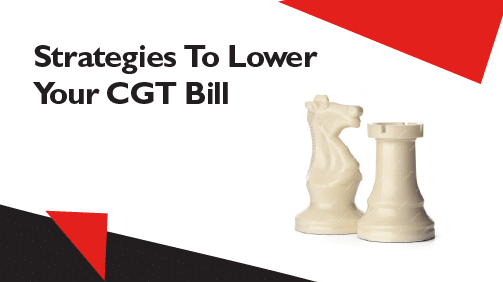
Strategies To Lower Your CGT Bill
- Utilise the 50% CGT discount: If you hold an asset for over 12 months, you’re eligible for a 50% discount on the capital gain.
- Correctly apply the main residence exemption: Even if you use part of your home for business purposes or as an investment, you may still qualify for a partial main residence exemption on CGT. Calculate and report the proportion of your home used for business or investment purposes and apply this percentage to determine the taxable portion of any capital gains.
- Apply indexation for pre-1999 assets: For assets acquired before September 21, 1999, you can use indexation to adjust the cost base for inflation up to September 30, 1999, reducing the capital gain and tax liability.
- Offset capital gains with capital losses: You can use capital losses to offset capital gains, reducing the overall taxable amount. If your losses exceed your gains in a financial year, you can carry forward the capital losses to offset future gains.
- Take advantage of small business CGT concessions: If you’re a small business owner, you might be eligible for certain concessions to reduce or eliminate your CGT liability, such as the 15-year exemption, 50% active asset reduction, retirement exemption, and rollover provisions.
- Contribute to superannuation: Using capital gains to make concessional (before-tax) contributions to your superannuation fund can reduce your taxable income, lowering your overall tax liability, including CGT.
Filing and Paying Your CGT
To file your CGT, first calculate your capital gain or loss.
Subtract the cost base of your property from its sale price and report this figure in the “Capital gains” section of your tax return.
When completed, lodge your return online via myGov or a tax agent.
You must pay your CGT by the same deadline as your income tax return: October 31, or March 31 if you have a tax agent.
You can pay
- Online via BPAY, credit card, or direct debit
- At an Australia Post office
- By mailing a cheque or money order to the ATO
Remember: late payments incur penalties.
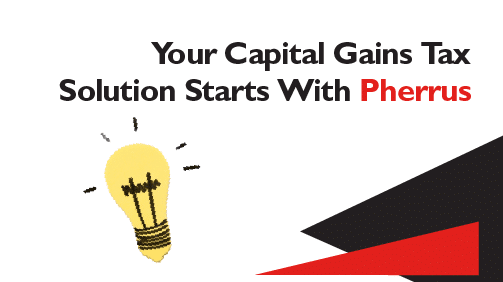
Your Capital Gains Tax Solution Starts With Pherrus
Understanding CGT and how much you’ll actually keep from your investment property’s sale will help you make your next smart investment decision.
As financial and taxation experts here at Pherrus, we can help you minimise your CGT liabilities, maximise your profits, and take care of all your property accounting needs.
Still wondering, “How much capital gains tax on property will I pay?”
For the answer, get in touch today by filling out our online form or calling (02) 9099 9109 to book an appointment at our Bella Vista office in Sydney, NSW.
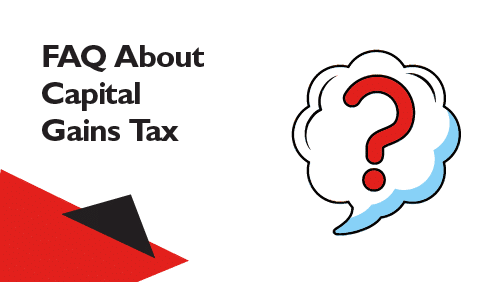
FAQs
Do You Pay Capital Gains Tax on an Investment Property in Australia?
Yes, you pay capital gains tax on the sale of an investment property in Australia.
The tax is calculated on the profit made from the sale, which is the difference between the sale price and the property’s cost base (including purchase price and associated costs).
Can I Move Into My Rental Property To Avoid Capital Gains Tax in Australia?
Moving into your rental property can potentially reduce capital gains tax but not eliminate it entirely.
You may be eligible for a partial exemption based on the period the property was your principal residence.
Do I Pay Capital Gains Tax When I Sell My House in Australia?
You generally don’t pay capital gains tax if the house you sell is your primary residence.
However, CGT does apply to investment properties and secondary residences.


